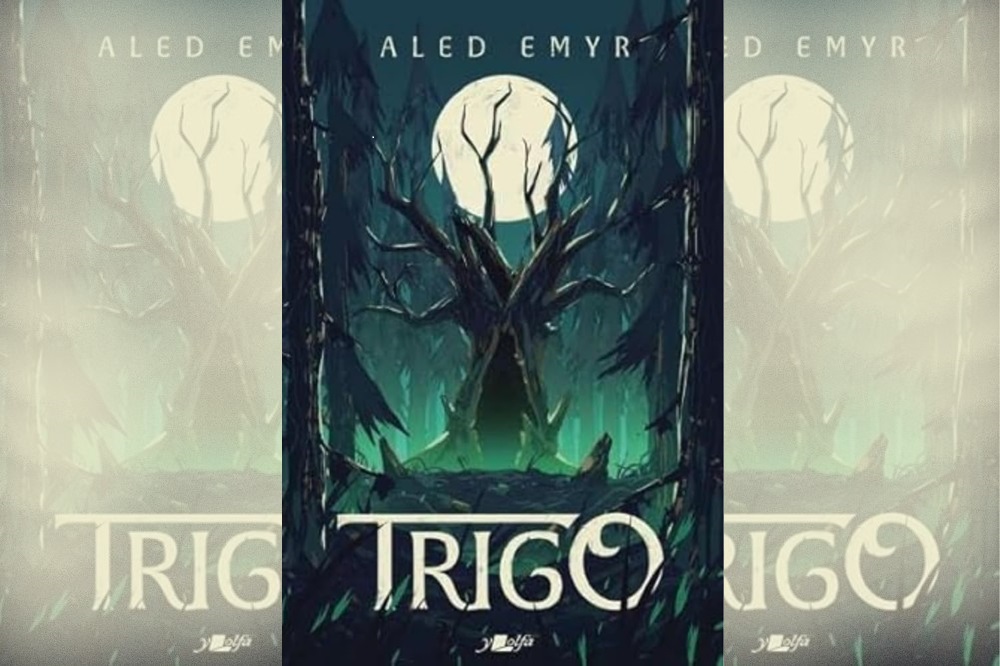Book review: Trigo by Aled Emyr

Ant Evans
When looking for some much needed escapism, an element of fantasy in a novel, opening the reader’s eyes and imagination to another world, can very much tick that box.
Trigo, by debut novelist Aled Emyr is the latest in the genre to allow the reader to get lost in a whole new world (luckily, the author has graciously provided the reader with a map in the beginning, thus ensuring getting completely lost is unlikely).
Our protagonist is Enid, the teenage daughter of the lord and lady of Ynys Afarus, Gwern and Alys. Enid is very much the rebellious teenager, not getting on with her parents at all. The initial bone of contention between parents and daughter?
An arranged marriage between Enid and Tyrfech, the son of Taran, an ally of Gwern’s and lord of Ynys y Gogledd, which as it later transpires, Tyrfech isn’t too keen on himself. But Taran has a chat with his son, making it clear that this marriage is, politically speaking, very much for Taran’s benefit.
Abduction
However, the focus for Enid shifts swiftly from the impending marriage to the abduction of her younger brother, Pedr. As she goes into his room to wake him, Enid notices, in addition to her brother’s absence, a pile of headless fish on his bed and a threatening message written in blood on the wall above Pedr’s bed:
“Release that which is locked in the dark, or else death shall be the boy’s fate. Gwydion knows.”
Who’s Gwydion, and what is it he knows? Time will tell.
In the ensuing argument, the reader gets an insight into pre-existing familial tensions. Gwern’s indifference to his children, in particular Pedr, “It’s no easy thing for any father to admit that his only son, his heir, is an unbearable disappointment to him.” Gwern dismisses his wife’s weeping as an act for the benefit of Rheunant, a member of his council. Is there previous history between them which Gwern is aware of, perhaps?
Gwern relents, telling his wife “I’ll send a few of my best soldiers to try and save him.” A few? Try? The reader gets the impression that he really isn’t all that bothered. Indeed, he’s much more enthusiastic about the impending arrival of Taran and Tyrfech. “Excellent! The councils of Ynys Afarus and Ynys y Gogledd have much to discuss.”
With her father preoccupied, Enid resolves to set out and find Pedr herself (which has the added bonus of putting the brakes on her having to get married.)
Wizard
Setting off to search for her brother and successfully evading her father’s soldiers in the Magic Forest, Enid soon encounters Gwydion, an elderly wizard (who’s later mistaken to be Enid’s grandfather due to his advanced age). Initially, he refuses point blank to help her “When I try to help people, people get hurt”. Though after having saved Enid from a wolf attack after she leaves his cabin, he does agree to assist her.
What follows is a story with plenty of twists and turns. Indeed, each of the locations portrayed within Trigo faces their own challenges, though they are each interconnected. For example, when the King of the four islands, Peredur Wyn, places restrictions on the number of ships entering and leaving his island of Ynys Wen, this leads to shortages of essentials on the other three islands and poverty, leading to immigration to Ynys Wen.
These immigrants being blamed by the king for the state of the island’s economy. Is it me, or does the scapegoating of immigrants when your economy’s tanking sound familiar? To say that relations between the four islands are strained would certainly be an understatement.
Having each of the chapters tell the story from a particular character’s point of view very much helps weave the elements above, and those which follow, together with ease. In addition to the map I mentioned earlier, the author has also included details of the family trees of the ruling families of the four islands, in addition to a list of each of the characters and which of the four islands, the Free Territories or Ynys Trigo, they call home. Each of these have helped in building a world which, chapter to chapter, was a pleasure (not sure some of the novel’s events could be described as pleasurable, mind you) to explore.
One thing which struck me was the novel’s title itself; Trigo meaning both to live, dwell, reside and the like, and also to perish or die (the death of livestock in particular being the meaning I was most familiar with growing up).
So, I found myself wondering when I began to read Trigo, which meaning is the author alluding to here? Or are both meanings equally appropriate? There’s only one way to find out…
Trigo by Aled Emyr is published by Y Lolfa and is available from all good bookshops.
Support our Nation today
For the price of a cup of coffee a month you can help us create an independent, not-for-profit, national news service for the people of Wales, by the people of Wales.






Brake as in stop a vehicle is not spelled break (shatter).